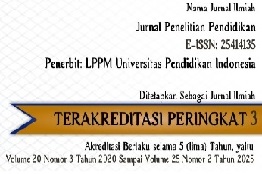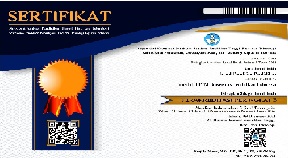Investigating Teachers’ Attitudes towards Teaching and Learning of English as a Lingua Franca (ELF) in Indonesian EFL Context
Abstract
Abstrak
Bahasa Inggris sebagai Lingua Franca (English as a lingua franca-ELF) telah mendapatkan perhatian yang tinggi dalam pengajaran bahasa Inggris tetapi masih kurang diteliti dalam konteks Bahasa Inggris sebagai Bahasa Asing (English as a foreign language-EFL) seperti di Indonesia. Penelitian ini bertujuan untuk meneliti sikap guru terhadap ELF dan beberapa kemungkinan tantangan dalam memasukkan pengajaran ELF ke dalam praktik pengajaran mereka. Menggunakan metode deskriptif kuantitatif dengan memberikan survei cross-sectional kepada 50 guru EFL di Jakarta, penelitian ini telah menemukan bahwa para guru memiliki sikap positif terhadap penggunaan ELF dalam proses belajar mengajara di konteks EFL Indonesia. Namun, ditemukan juga tidak familiernya guru dengan aksen lain, kesiapan guru, siswa, dan institusi dalam memasukkan pengajaran ELF, menyediakan materi pembelajaran yang sesuai, dan penutur asli sebagai tantangan yang dihadapi dalam memasukkan ELF ke dalam pengajaran mereka. Studi ini menawarkan beberapa saran untuk menjelaskan perkembangan guru dan peningkatan pengajaran ELF dalam konteks Indonesia.
Kata kunci: Sikap Guru EFL, Bahasa Inggris sebagai Lingua Franca (EFL), konteks EFL Bahasa Indonesia.
Abstract
English as a Lingua Franca (ELF) has received increased attention in English teaching but is still less studied in an EFL context like Indonesia. This study aims at investigating teachers’ attitudes toward ELF and some possible challenges in incorporating ELF instruction into their teaching practices. Employing a quantitative descriptive method by administering a cross-sectional survey to 50 EFL teachers in Jakarta, the study revealed that the teachers had a positive attitude towards teaching and learning ELF in the Indonesian EFL context. However, it is also discovered teachers accentuated unfamiliarity with other accents, the readiness of teachers, students, and institutions in incorporating ELF instruction, providing suitable learning materials, and native speakers as challenges encountered in incorporating ELF into their teaching. This study offered several suggestions to shed a light upon teachers’ development and enhancement of teaching ELF in the Indonesian context.
Keywords: EFL Teachers’ attitudes, English as a Lingua Franca (EFL), Indonesian EFL context.
Keywords
Full Text:
PDFReferences
Asakereh, A., Yousofi, N., & Weisi, H. (2019). ELF in the Iranian education system: Exploring teacher trainers' and pre-service/in-service English teachers' attitudes. Cogent Education, 1-32.
Bayyurt, Y., & Sifakis, N. (2015). Developing an English as a lingua franca pedagogy; Insights from self-education program. In P. Vettorel, New frontiers in teaching and learning English (pp. 55-76). Newcastle Upon Tyne: Cambrige Scholar Publishing.
Bjørge, A. (2012). Expressing disagreement in ELF business negotiations: Theory and practice. Applied Linguistics, 33(4), 406-427.
Brown, J. D. (2012). EIL curriculum development. In L. Alsagoff, S. McKay, G. S. Hu, & W. A. Renandya, Principles and practices for teaching English as an international (pp. 147-167). New York: Routledge.
Cogo, A. (2009). Accommodating difference in ELF conversations: A study of pragmatic strategies. In A. Mauranen, & E. Ranta, English as a lingua franca: Studies and findings (pp. 254-273). Newcastle upon Tyne: Cambridge Scholars Publishing.
Cogo, A. (2012). English as a lingua franca: Concepts, use and implications. ELT Journal, 97-105.
Coskun, A. (2010). Whose English should we teach? Reflections from Turkey. ESP World, 9(1), 1-20.
Crystal, D. (2003). English as a global language. Cambridge: Cambridge University Press.
Decke-Cornill, H. (2002). 'We would have to invent the language we are supposed to teach': The issue of English as Lingua Franca in language education in Germany. Language, Culture and Curriculum, 15(3), 251-263.
Deterding, D., & Kirkpatrick, A. (2006). Emerging South-East Asian Englishes and intelligibility. World Englishes, 25(3/4), 391-409.
Evans, B. E. (2010). Chinese perceptions of Inner Circle varieties of English. World Englishes, 29(2), 270-280.
Fang, F. G. (2017). English as lingua franca: Implication for pedagogy and assessment. TEFLIN Journal, 57-70.
Firth, A. (1996). The discursive accomplishment of normality: On conversation analysis and lingua franca English. Journal of Pragmatics, 26, 237-259.
Floris, F. D. (2014). Idea sharing: Introducing English as an International Language (EIL) to pre-service teachers in a World Englishes course. PASAA, 47, 215-231.
Galloway, N., & Rose, H. (2014). Using listening journals to raise awareness of Global Englishes in ELT. ELT Journal Advance Access, 1-11.
Grazzi, E., & Lopriore, L. (2020). ELF awareness for teacher education in Italy: Attitudes and actions. Estudos Linguisticos e literarios, 69-89.
İnceçay, G., & Akyel, A. (2014). Turkish EFL teachers’ perceptions of English as a Lingua Franca. Turkish Online Journal of Qualitative Inquiry, 5(1), 1-12.
Jenkins, J. (2009). English as a lingua franca: Interpretations and attitudes. World Englishes, 28(2), 200-207.
Jenkins, J., Cogo, A., & Dewey, M. (2011). Review of developments in research into English as a lingua franca. Lang. Teach., 44(3), 281-315.
Kang, O. (2015). Learners' perceptions toward pronunciation instruction in three circles of World Englishes. TESOL Journal, 6(1), 59-80.
Kaur, J. (2009). Pre-empting problems of understanding in English as a lingua franca. In A. Mauranen, & E. Ranta, English as a Lingua Franca: Studies and Findings (pp. 107-123). Newcastle upon Tyne : Cambridge Scholars Publishing.
Kaur, J. (2010). Achieving mutual understanding in World Englishes. World Englishes, 29(2), 192-208.
Kaur, J. (2014). Attitudes towards English as a Lingua Franca. Procedia Social and Behaviour Science, 214-221.
Kirkpatrick, A. (2007). World Englishes implications for international communication and English language teaching. Cambridge: Cambridge University Press.
Kirkpatrick, A. (2008). English as the official working langiage of the Association of Southeast Asian Nations (ASEAN): Features and strategies. English Today, 24(2), 27-24.
Kirkpatrick, A., & Sussex, R. (2012). English as an International Language in Asia: Implications for Language Education. New York: Springer.
Lopriore, L. (2018). ELF in ELT education: New paradigms in language awareness. In: ELF-awareness in ELT: Bringing together theory and practice. Journal of English as a Lingua Franca, 7(1), 160-166.
Luo, W. (2016). Teacher perceptions of teaching and learning English as a lingua franca in the expanding circle: A study of Taiwan. English Today, 1-10.
Mairi, S. (2016). an English as a Lingua Franca (EFL) perspektif in asian English language taaching (ELT). Proceedings of the Fourth International Seminar onEnglish Language and Teaching (ISELT-4), 283-293.
Matsuda, A. (2003). Incorporating World Englishes in teaching English as an International Language. TESOL Quarterly, 37(4), 719-729.
Matsuda, A., & Friedrich, P. (2011). ‘English as an international language: A curriculum blueprint. World Englishes, 30(3), 332-344.
Mauranen, A. (2006). Signaling and preventing misunderstanding in English international. Journal of the Sociology of Language, 177, 123-150.
Mauranen, A. (2018). Conceptualising ELF. In J. Jenkins, W. Baker, & M. Dewey, The Routledge Handbook of English as a Lingua Franca (pp. 7-24). New York: Routledge.
McKay, S. L. (2003). Toward an appropriate EIL pedagogy: Re-examining common ELT assumptions. International Journal of Applied Linguistics, 13(2), 1-22.
McKay, S. L. (2012). Principles of teaching English as an International Language. In L. Alsagoff, S. L. McKay, G. S. Hu, & W. Renandya, Principles and Practices for Teaching English (pp. 28-46). New York: Routledge.
Monfared, A., & Khatib, M. (2018). English or Englishes? Outer or Expanding Circle Teachers' Awareness of and Attitude toward Their Own Variants of English in ESL/EFL Teaching Context. Australian Journal of Teacher Education, 43(2), 56-75.
Mukminatien, N. (2012). Accommodating World Englishes on developing EFL learners' oral communication. TEFLIN Journal, 23, 222-232.
Musthafa, B., Hamied, F. A., & Zein, S. (2019). Enhancing the quality of Indonesian teachers in the ELF era. In S. Zein, Teacher education for English as a Lingua Franca: Perspectives from Indonesia (pp. 175-190). New York: Routledge.
Nagy, T. (2016). English as a Lingua Franca and its implications for teaching English as a foreign language. Acta Universitas Sapientiae, Philologica, 8(2), 155-166.
Rahayu, G. (2019). Indonesian EFL teacher' perception about teaching English as a lingua franca. LangEdu Journal, 1-14.
Saengboon, S. (2015). An exploratory study of Thai university students' understanding of World Englihes. English Language Teaching, 8(11), 131-154.
Seidlhofer, B. (2005). English as a lingua franca. ELT Journal, 59(4), 339-341.
Seidlhofer, B. (2009). Common ground and different realities: World Englishes and English as a lingua franca. World Englishes, 28(2), 236-245.
Seidlhofer, B. (2011). Understanding English as a lingua franca. Oxford: Oxford University Press.
Shibata, M. (2009). Japanese pre-service teachers' attitudes towards AETs. JALT, 984-997.
Shim, R. (2002). Changing attitudes towards teaching English as a world language in Korea. Journal of Asian Pasific Communication, 12(1), 143-158.
Sifakis, N. (2004). Teaching EIL - teaching international or intercultural English: what teacher should know. System, 32(2), 237-250.
Sifakis, N. (2009). Challenges in teaching ELF in the perphery: The Greek context. ELT Journal, 63(3), 230-237.
Sifakis, N. (2014). ELF awareness as an opportunity for change: A transformative perspective for ESOL teacher education. Journal of English as a Lingua Franca, 3(2), 317-335.
Snodin, N., & Young, T. (2015). ‘Native-speaker’ varieties of English: Thai perceptions and attitudes. Asian Englishes, 17(3), 248-260.
Soruç, A. (2015). Non-native teachers’ attitudes towards English as a Lingua Franca. Hacettepe Üniversitesi Eğitim Fakültesi Dergisi (H. U. Journal of Education), 30(1), 239-251.
Topkaraoğlu, M., & Dimlan, H. (2017). ELF awareness in English language education. International Journal of Language Academy, 5(5), 39-58.
Young, T., & Walsh, S. (2010). Which English? Whose English? An investigation of ‘non-native’ teachers' beliefs about target varieties. Language, Culture and Curriculum, 1-15.
Yücedağ, Z., & Karakaş, A. (2019). High school language division stuidents' perceptions of English as a Lingua Franca. Proceedings of the Fourth International Seminar on English Language and Teaching (ISELT-4), 27-42
DOI: https://doi.org/10.17509/jpp.v21i2.35131
Refbacks
- There are currently no refbacks.
Copyright (c) 2021 Jurnal Penelitian Pendidikan


